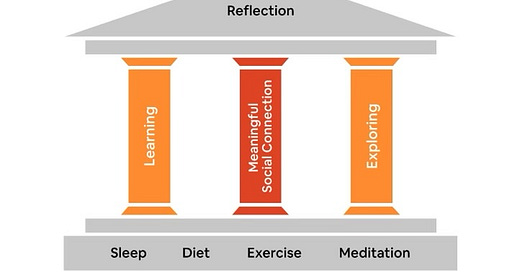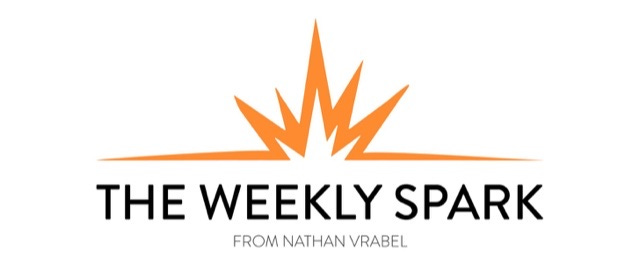Weekly Spark #243: Mental Health Awareness Month
Welcome to The Weekly Spark, my weekly newsletter featuring insights on mental and physical wellness, intentional living, and personal development. Since September 2020, I’ve published 243 reflections hoping to motivate myself and others to live more thoughtful, purpose-driven lives.
May is Mental Health Awareness Month. Similar to other commemorative days and months throughout the year, the observance of topics this important can’t be reduced to a specific month, but if establishing a time to focus in on something is what it takes to garner more attention, I’m all for it. Improving mental health is the reason why I’m here. That’s one of the main reasons why I ever started The Weekly Spark. My own mental health challenges led me down a journey of personal development, reflection, and community building starting my sophomore year of high school. When I started Candlelight Conversations during Covid in spring of 2020 (we all remember where we were), I sought to create a community growth-seekers reflecting and pushing each other to live more authentically and intentionally. Mental health is the most important pillar of that. Without it, we are nothing. In such a challenging, somewhat helpless time, a lot of my questions revolved around two simple questions: what can we do? How can we continue to improve our mental health and that of others?
For yourself, listen to the whisper. There is a whisper inside of you that can, with a precise amount of accuracy, tell you what and how you are feeling. It can also tell you when something may be off. Whether it’s feeling slightly anxious, depressed, stressed, or just simply not yourself, it will let you know. It’s so important to listen to that voice and not suppress it. Sometimes it’s a whisper nudging you that something needs to change. Other times, it can be smack you right in the face and it’s impossible to miss. The goal is to catch the whispers early so that those larger more pronounced “warnings” don’t happen.
Act on the whispers and take them elsewhere. Don’t just keep them bottled up inside. Whether it’s writing your raw and candid thoughts in a journal, having conversations with a close and trusted friend, partner, or family member, or taking the courageous step to enroll in therapy, you have options. Therapy is a great tool because those guys and girls are literally (as I remind my own) paid to sit there, listen to us talk, and ask thoughtful questions. Friendships are generally 50/50 for who has the mic and most people don’t want to overwhelm their friends with their problems. In therapy, however, it’s about 95/5 for us talking vs. them talking. That’s a powerful session and opportunity to spill everything and everything. During my sophomore year of high school when I was so anxious I could hardly make it through a school day, I was in therapy. During my sophomore year of college when I was struggling after a recent breakup and knee surgery, I was in therapy. During senior year of college when I was flat for a variety of reasons, I was in therapy. Seeking therapy for your own well-being is not a sign of weakness; it’s a sign of strength. Recognizing that something is off and taking proactive, conscious steps towards improving it is what courageous people do. If you’re feeling something, say something,
Lastly, we have an oath to promote mental wellbeing in others and to have a sharp eye for when something may be off. It can be hard to say to a friend or loved one “hey, just wanted to check in because I know XXX is going on and just wanted to see how you are doing” or “hey, you seem a little off the last few days. Just wanted to check in if everything is alright,” but it’s ALWAYS the right thing to do. I have never regretted on checking in on someone I care about. Not once. Occasionally, toxic positivity and the desire to “appear ok” will put up a wall to those deeper and more vulnerable discussions, but other times, if you provide a trustworthy and caring environment for others, it’ll open up a vessel for helpful and productive conversation. You never know who may need it. The least we can do is try.
When I started struggling with anxiety in 2013, I sought to be my own case study. What are the tools and thought processes that would help me? Below are a few that have specifically helped me (in no particular order):
Patience - There is no quick fix when you are feeling down. Understanding that you won’t feel better in a day or immediately is an important step. Having one conversation with a friend, journaling, going to therapy, or using other tools that “work” to promote mental well-being are not quick fixes. Having patience with the process and others is an important step in the journey.
Let yourself feel it - By attempting to suppress emotions or cover them up, you only make them worse. Relief may be temporary, but in the long run, your problems and feelings may get worse and bubble up at the wrong times. As I say, let your feelings come in, rain over you, and move through you naturally. It may take a few hours, days, or weeks, but they will run their course most efficiently if you let them.
Take care of physical health - sleep, clean diet, intentional exercise/movement
Meditation - yoga nidra or some guided breathing/meditation are science-based tools to helping promote mental wellness
Therapy - The benefits of talking to someone who is impartial and designed to help you think more deeply about your life are pronounced. Note, these people will not help you SOLVE problems; they will help you think through your problems and through that, develop solutions on your own. Good therapists mainly ask questions; if you’re looking for quick “fixes,” you’re in the wrong spot.
Journaling - I talk about this all the time, my only regret about journaling is not starting sooner. Nothing compares to having a safe space to spill your raw and unfiltered thoughts.
No social media - I don’t want to beat a dead horse, but this is the most psychologically disruptive technology that exists today. Social media preys on the insecure; people struggling in their own skin log onto social media and wonder why they don’t feel good about themselves when they spend hours a day on an app that is designed to make them feel inferior to others. Shutting yourself out from the noise of other people that you aren’t even friends with and focusing on the life in front of you isn’t a novel idea; it’s the pathway to more security and peace of mind. I go in and out of social media over the years (I don’t really have much problem with it anyway because I have confidence in my own journey and frankly wouldn’t want to live anyone else’s). Most recently, I cut it off in July 2024, and I have felt much better and more productive with time to pursue more meaningful things and real-life relationships.
Talking - Just talk about it. Talk with friends about mental health. Check in with them. It’s incredible the conversations I’ve been able to have and the ways we have helped each other just by making the first move and talking about something that can be seen as taboo.
Everyone is on their own mental health journey. No two are the same. I’d love to hear your story and experiences with your own mental health. What are the tools that have helped you in your path? What are the challenges you are facing? Wherever you are on your journey, I am here for you. Your (real) friends and family are here for you as well. There are a lot more people struggling than you realize, and everyone knows someone dealing with mental health challenges. There is a community much bigger than you realize that is here for you as well. Stay strong and be well. For Mental Health Awareness Month, I challenge you to start more conversations on mental health, both your own and for others. Here’s to growing the community of people seeking to help, support, and grow one another to live more authentically and intentionally.
Mental Diet
📚What I’m Reading: The Courage to Be Disliked: The Japanese Phenomenon That Shows You How to Change Your Life and Achieve Real Happiness by Ichiro Kishimi & Fumitake Koga
Quote of the Week:
“Your mental health is everything - prioritize it. Make the time like your life depends on it, because it does.” - Mel Robbins
I hope you enjoyed reading as much as I enjoyed writing. If you are enjoying The Weekly Spark, please share with a friend, family member, or coworker who you think might benefit. If you have thoughts, comments, or feedback, please reply to this email and share them; I’d love to hear from you! Until next time… Take care of yourself and take care of each other. 🙏
Nathan





